By a guest contributor
This is a crosspost from Socialist Unity
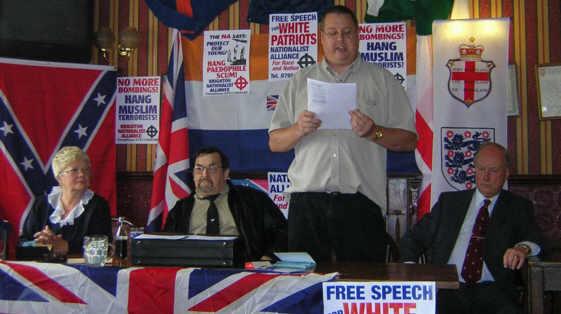
Tess Culnane at a Nationalist Alliance meeting in Brighton in July 2005 with John Wood, Sid Williamson and John Tyndall – the ‘Free Speech for White Patriots’ slogan is in defence of Tyndall, who in April 2005 was charged with incitement to racial hatred
UNDER the headline “‘Neo-Nazi gran’ hired as aide to BNP member on London Assembly”, the London Evening Standard has exposed the fact that the notorious far-right activist Tess Culnane is working at City Hall as a PA to Richard Barnbrook. There is also good coverage of the case by Adam Bienkov at Liberal Conspiracy. It is however worth examining Culnane’s political record in more detail, since the employment of such an individual in the office of the BNP’s most prominent London politician tells us a lot about the BNP’s claim that it is now a mainstream party that has put its neo-Nazi past behind it.
Who is Tess Culnane?
A well-known figure on the far right in South East London for many years, Culnane has never shown any sympathy with Nick Griffin’s attempts to hide the BNP’s core fascist ideology and present a more respectable image in the interests of electability. On the contrary, she has always been a supporter of the hardline politics of John Tyndall, the veteran fascist ousted as BNP chairman by Griffin in 1999. When Tyndall died in 2005 a Guardian obituary described him as “a racist, violent neo-nazi to the end”. Culnane, for her part, hailed Tyndall as “a wonderful orator, a brilliant mind, a true patriot who inspired us all. A gentleman in every sense of the word”.
Culnane stood as a BNP candidate in the Downham ward in the Lewisham Council elections in May 2002 and then in a by-election in the same ward in November that year. She did particularly well in the by-election, gaining 519 votes (20.1%) and finishing third behind the Lib Dems (998 votes) and Labour (769). It was a mark of Culnane’s political status within the BNP that she was No.2 on the party’s list for the 2004 European Parliamentary elections in London and No.5 on the list for elections to the London Assembly held on the same date.
Culnane’s failed libel action
During the November 2002 Lewisham by-election the Lib Dems circulated a leaflet headed “Don’t be fooled by the BNP” which referred to the fact that leading figures in the BNP had convictions for violence and other crimes. “When you go to vote on November 7th,” the leaflet concluded, “ask yourself – is this the kind of person you want as your elected councillor?”
Culnane launched a libel action against Mark Morris, the Lib Dem candidate who won the by-election, and his agent on the basis that she personally didn’t have convictions for the crimes mentioned in the leaflet, but she lost the case, lumbering herself with some £100,000 in costs. She appealed but lost again, with the Court of Appeal finding that there was “no arguable basis” for overturning the verdict.
The case was reportedly the source of conflict between Culnane and the BNP leadership, who claimed that they had advised her against the libel action. The advice was sound – as the verdict showed, it isn’t easy for a notorious far-right racist to persuade a court that their reputation has been damaged.
Culnane splits from the BNP
However, the immediate cause of Culnane’s 2005 split from the BNP was that she refused to accept the BNP leadership’s demand that she should cease associating with other more extreme far-right organisations, including an openly Nazi groupuscule called the British People’s Party.
In October 2005 the BNP announced that the BPP was proscribed along with another Nazi group, the Nationalist Alliance, with which Culnane had also been involved. The BNP stated that these two organisations “are used by hostile media elements to link our party to them. We don’t need or want the skinhead and nazi image which the NA and BPP thrive on and so it is necessary for us to make it very clear that there is a complete separation”. It was declared “a serious disciplinary offence for any BNP member to attend any event organised by these groups, to bring any of their propaganda to our events, or to be a paid up member of any of these groups”.
The press report on the failure of Culnane’s libel action also stated that the BNP “says she is no longer a member of the party”. There was some confusion over whether Culnane had in fact been expelled, and she herself appeared uncertain as to whether she was still in the party. However, at the end of November, in a post on the white supremacist Stormfront website, Culnane resolved the situation by announcing that she would not be renewing her BNP membership, on the grounds that she refused to cease associating with the likes of the BPP. Indeed, she made it clear that she had more in common with these open Nazis than she did with leading figures in her own party.
“I will not be instructed”, she wrote, “to dis-associate myself from certain other true nationalists many of whom, in my opinion, have been unjustly proscribed and by rights should be in the highest echelons of the British National Party thus replacing certain people that are obviously unsuitable to hold their current positions in the party.”
In December the BPP’s e-zine Nationalist Week published a message from Culnane backing their open letter to the BNP objecting to proscription. “I am somewhat puzzled”, she wrote, “as to how, by any stretch of the imagination, the leadership of the BNP can possibly proscribe another White nationalist party.”
What Tess did next
The BPP was too small to give Culnane any effective backing in elections after she left the BNP, so she joined the National Front. She contested a by-election in the Lewisham Whitefoot ward on behalf of the NF in September 2007, getting 95 votes (3.6%). (Due to an administrative cock-up on the part of the NF she had to stand as an independent, though the ballot paper carried the NF logo next to her name.)
Culnane again stood for the NF in the London Assembly elections in May 2008 in the Greenwich and Lewisham constituency, where she got 8,509 votes (5.8%). This compared favourably with the BNP’s vote for the Londonwide list in Greenwich and Lewisham (9,764 votes – 6.6%), even though the BNP had a much more high-profile and effective campaign than the NF, while the BNP’s mayoral candidate Richard Barnbrook got only 5,170 first preference votes (3.5%) in the same GLA constituency. Culnane was also the NF candidate in the Haltemprice and Howden parliamentary by-election in July 2008, where she got 544 votes (2.29%).
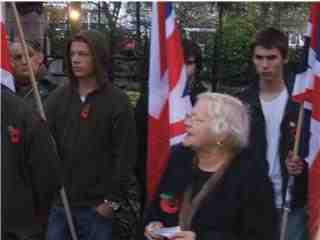
Culnane addresses the National Front Remembrance Day parade in November 2007
Her involvement with the NF did not prevent Culnane from continuing her association with the BPP. In April 2007 she was a speaker at the BPP’s St George’s Day meeting in Hove, where she shared the platform with notorious Holocaust denier Lady Michele Renouf, against a backdrop of fascist symbols and posters bearing slogans like “Hang paedophile scum”. The BPP proudly posted photos of the event on its website, with the picture of Culnane captioned “Tess Culnane – respected British patriot”.
As late as September 2008, only a few months before she rejoined the BNP, the BPP announced that Culnane would be a featured speaker at its Nationalist Unity Rally in London. In the run-up to the meeting Kate Dermody of the BPP Women’s Division published a helpful summary of her party’s political views (“we have to witness our children being brainwashed into believing Hitler killed six million Jews despite OFFICIAL figures being put at less than 300,000 NATURAL deaths”), and at the rally itself “an original authenticated photograph of Hitler” was raffled.
It was quite clear that Culnane retained her links with the most hardline elements on the far right.
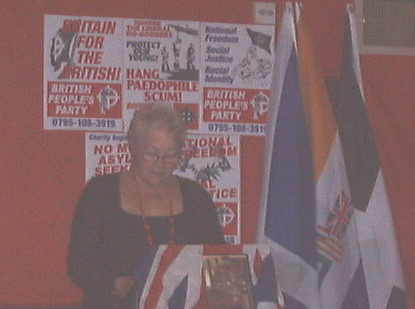
Culnane speaks at the British People’s Party St George’s Day meeting in April 2007
Culnane rejoins the BNP
Nevertheless, in January 2009 the BNP announced that Culnane had rejoined the party and that she would stand as the BNP candidate in a by-election in the Downham ward the following month (she got 287 votes – 10.6%). In a reference to Culnane’s split from the BNP over her insistence on consorting with openly Nazi organisations, the BNP report of Culnane’s return made passing mention of previous “clashes between people that at the time may have seemed important, but with the perspective of time, pale into insignificance”.
Presumably, as an incentive to rejoin the party, the BNP leadership offered Culnane some leeway on this issue, in line with that accorded to another unreconstructed Tyndallite, Richard Edmonds, who has been allowed to organise the Friends of John Tyndall as a vehicle for bringing dissident BNPers opposed to the “liberalising” of the party together with similarly minded fascists from outside the BNP.
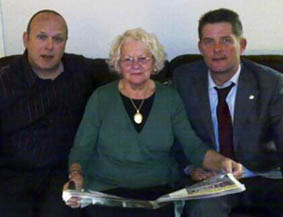
Culnane is welcomed back into the BNP by the party’s national organiser Eddy Butler and London Assembly member Richard Barnbrook
In June 2009 both Culnane and Edmonds spoke at the annual Friends of John Tyndall Memorial Meeting. It was jointly organised by Edmonds, Rick Fawcus of the fascist marketing group Tyr Services and Anna Seymour of the England First Party, and was chaired by Keith Axon, formerly of Sharon Ebanks’ now defunct New Nationalist Party. The other speakers were Mike Easter, campaign manager for Chris Jackson’s failed 2007 leadership challenge to Griffin, Ian Edward of the NF, Steve Smith and Peter Rushton of the EFP and Tyndall’s widow Valerie, who told the meeting that before his death her late husband had become reconciled with Colin Jordan, his former associate in the White Defence League and National Socialist Movement of the late 1950s and early ’60s. Among those attending the meeting were Jim Lewthwaite of the Bradford-based Democratic Nationalists, the BNP’s former Croydon organiser Bob Gertner, another Croydon BNP hardliner Paul Ballard who was convicted of inciting racial hatred together with Griffin back in 1998, and the ubiquitous Holocaust denier Michele Renouf.
On rejoining the party Culnane was immediately put to work speaking at BNP meetings in London. Her speech to Bromley and Lewisham BNP in April 2009, a video of which was posted on the BNP website (it has since been removed, but can be viewed here), was particularly well received. “I like especially her comments about the behaviour of her neighbours,” one admirer wrote, “and the way black immigrants so often destroy the quality of people’s lives. ‘They have ruined the lives of my family since 1969’, she said – by bringing unbearable levels of noise and the constant fear of crime into their lives.” Culnane also indignantly related the tale of how her bus driver son was sacked after he told a passenger to “shut her black mouth” and his trade union refused to defend him. She claimed that this was an example of “the tragedy that’s hit my family because of multiculturalism”, attributing it to the fact “successive governments have done nothing to stem the tide of invasion into this country”.
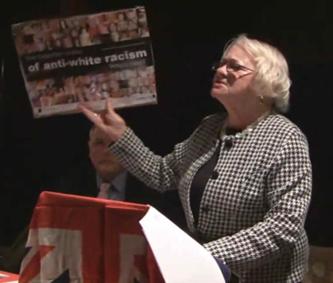
Culnane speaks to Bromley & Lewisham BNP in April 2009 (Barnbrook’s researcher Chris Roberts is on her right)
Why did the BNP have Culnane back, and why did she rejoin? “It’s an odd choice on the surface for the respectability seeking euro nationalist BNP,” a local blogger wrote, “who have moved in an almost opposite way to Tess of recent years who seems far too much of an unreconstructed racist for whom the BNP were nowhere near as extreme as she would have liked them to be.”
However, from the standpoint of the BNP leadership, it was a problem for them that the most prominent figure on the far right in South East London was not a member of the party. Culnane’s personal following locally was enough to win her a fifth of the vote in the 2002 Downham by-election and a bigger share of the vote than the BNP’s mayoral candidate in the 2008 London elections. As for Culnane’s own motives, by rejoining the BNP she became part of an organisation that could at least mobilise a significant number of activists to support her in elections, which is more than the BPP or even the NF could do.
The BNP leadership’s decision to offer Culnane employment in Barnbrook’s City Hall office looks like part of a tactic of neutralising Tyndallite dissidents by incorporating them into the party apparatus, comparable to Griffin’s decision to co-opt Richard Edmonds onto the BNP’s Advisory Council in September 2008. Her new position will certainly make it impossible for Culnane to appear on the platforms of outfits like the BPP, or defect to the NF as Chris Jackson and Mike Easter have recently done, if she wants to keep her job.
Culnane may have renounced public appearances on the platforms of rival organisations to the right of the BNP, but there is of course no indication at all that her political views have changed. The fact is that Barnbrook’s office staff now includes an individual with a long record of links with unashamed Nazis. As Labour’s London Assembly member Murad Qureshi is quoted as saying in the Evening Standard report: “In this instance the BNP has revealed its fascist underbelly, and voters should not be fooled by the party’s attempts to present a more moderate image.” This point needs to be advertised by anti-fascists in London in the run-up to the elections in May.

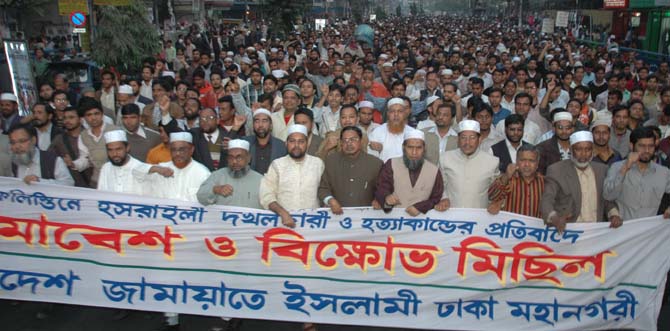
 A Labour minister says his party has been infiltrated by a fundamentalist Muslim group that wants to create an “Islamic social and political order” in Britain.
A Labour minister says his party has been infiltrated by a fundamentalist Muslim group that wants to create an “Islamic social and political order” in Britain.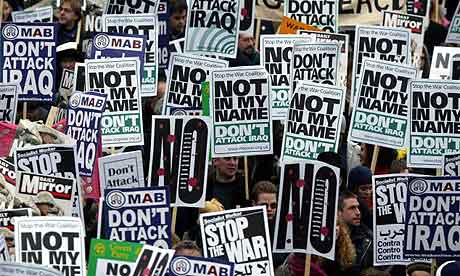
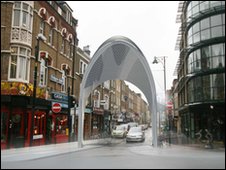 The
The 




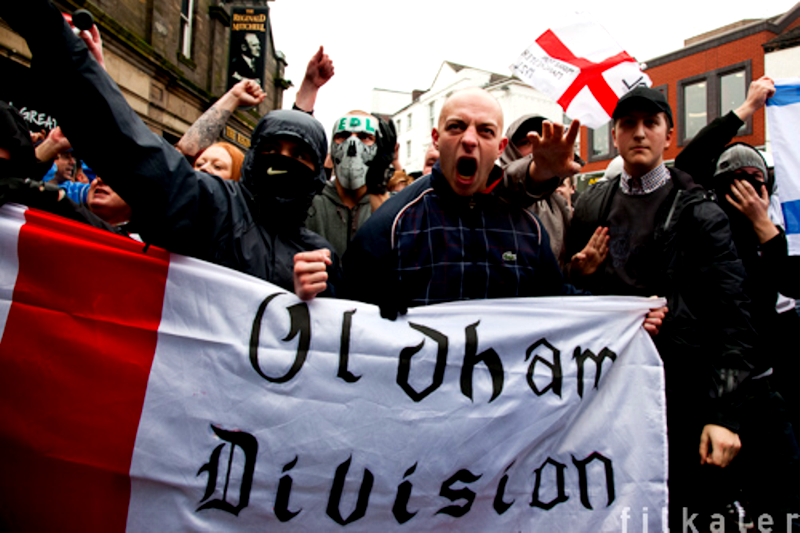
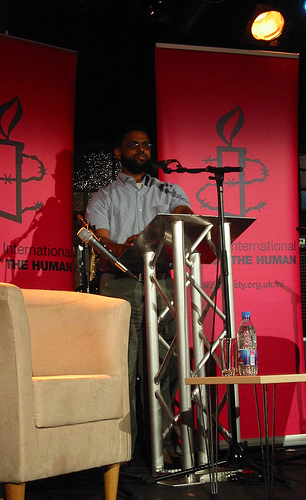 A senior official at Amnesty International has accused the charity of putting the human rights of Al-Qaeda terror suspects above those of their victims.
A senior official at Amnesty International has accused the charity of putting the human rights of Al-Qaeda terror suspects above those of their victims. “Islam doesn’t demand that men cover their faces before they go out, but its more extreme advocates place special conditions on how women dress outside the home. It’s a typical example of patriarchal practice, based on the notion that women should be under the control of their male relatives at all times, and it’s incompatible with any notion of universal human rights….
“Islam doesn’t demand that men cover their faces before they go out, but its more extreme advocates place special conditions on how women dress outside the home. It’s a typical example of patriarchal practice, based on the notion that women should be under the control of their male relatives at all times, and it’s incompatible with any notion of universal human rights….